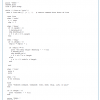|
|
No One Left Behind: Make Time for Accessibility Testing Ten percent of the world's population lives with some sort of disability. So, is your software product optimized accessible to these people? Rajini Padmanaban takes a look at the different types of disabilities out there and the ways to ensure your product works well with as many of these needs as possible.
|
|
 |
When Software Smells Bad Most software needs to be "maintainable" and have high "internal quality." But what does that mean in practical terms? Code smells form a vocabulary for discussing code quality and how well suited code might be to change. The smells also provide good indications as to what to refactor and how.
|
|
|
|
Getting Agile With User-Centered Design Agile practices go a long way toward providing value to our customers. But in today's market, we must endeavor to adopt a more user-centered approach to create products our customers can't live without.
|
|
|
|
How to Fail Less and Enjoy More The shiniest software application in the world, shipped on time and under budget, is a failure if it doesn't make someone's job easier. Failures cost us customers and money. How can we design software that our customers want to use and that will reduce our cost of failure?
|
|
 |
Ready, Aim, Release Think you know what your customer wants? Can you afford to be wrong? Based on the concept of tracer ammunition, which allows a shooter to follow the path of a bullet toward its target and adjust his aim as needed, tracer bullet software development can help you better understand your users’ wants so you can build a product that hits the mark.
|
|
 |
I Didn't Know I Needed That There is a natural relationship between the features in a product and the customer's satisfaction with that product, but not every feature influences customers in the same way. The best plan for satisfying customers, as author Mike Cohn explains, is to give them what they want.
|
|
 |
What's the Buzz Need information but don’t have time to wade through bookracks looking for that perfect reference? The StickyMinds.com Books Guide can help. Get the scoop from StickyMinds.com members on three books that can keep you up to date on the latest issues.
|
|
 |
An Elephant in the Room We make software so that people can use it. Yet these users are so hard to define that they are often simply ignored. This six-step approach to Interaction Design can help you bring your customers down to size so that you can provide the right product for them.
|
|
 |
Walking the Fine Line between Helpful and Harmful Jeff Johnson examines user interface problems caused by designers trying to rearrange users' data. He gives examples of software that is too helpful, and concludes that software should support users in their management of displays without managing the displays for them.
|
|

